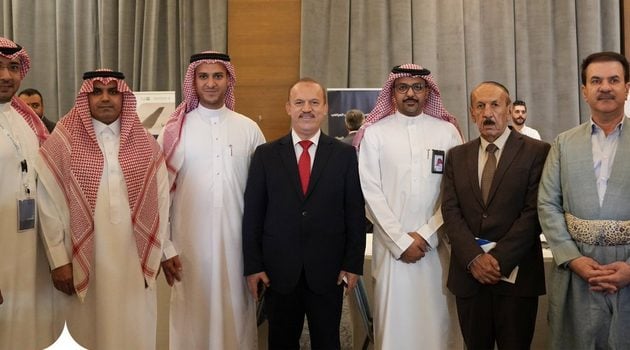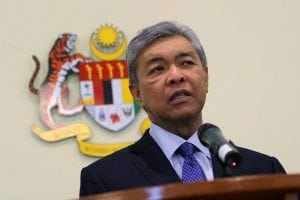
Najib and Rosmah listening to Kazakh’s music. Pic by Zid Omar
From Mohd Nasir Yusoff
ASTANA (Kazakhstan), June 7 (Bernama) — Datuk Seri Najib Tun Razak’s visit to Kazakhstan has not only strengthened bilateral ties and opened up new areas of cooperation but also created renewed interest about Malaysia among many in this Central Asian republic’s 16 million population.
Many among the 700,000 residents of this capital city were aware of the visit by the Malaysian Prime Minister and his delegation.
Malaysian journalists covering the visit and some 250 Malaysians who descended on this capital city to participate in the 7th World Islamic Economic Forum. (WIEF) too were flooded with questions about Najib and Malaysia.
A few journalists who went to buy some local telephone cards at a shopping mall here were pleasantly surprised when many who noticed them popped the question “Malaysia?” and gave the thumbs up as they could not really communicate verbally due to language barriers.
Malaysian flags flew side by side with Kazakhstan’s flag at strategic locations around the city and news of the official welcoming ceremony accorded to Najib at the President’s Palace ‘Akorda’ were shown during prime time on various TV stations and news and pictures of the event made its way into most local newspapers.
During a joint press conference yesterday, President Nazarbayev was full of praise for Najib and Malaysia and Malaysia’s contributions towards improving the economy of not just Muslims but also for the world at large especially developing countries and members of the Organisation of Islamic Conference (OIC).
Nazarbayev, said Kazakhstan, which will be taking over the chairmanship of the OIC this month, hoped to learn from and get valuable guidance from Malaysia’s experiences as past chairman and an active member of the grouping.
“Malaysia has become an example and model country to many among the developing nations and is well known as an Asian Tiger,” he said, adding that he attached great importance to Najib’s visit to pave the way forward in the bilateral relations between Kazakhstan and Malaysia.
He also noted the huge contributions of Najib’s father, the late Tun Abdul Razak Hussein to Malaysia’s development.
He said Astana, the capital city and the second largest metropolis in Kazakhstan, was almost like Putrajaya, Malaysia’s administrative centre and that Kazakhstan was very keen to learn from Malaysia’s success and dynamics in Islamic banking and finance.
In fact, to reflect his appreciation of Malaysia, President Nazarbayev requested Najib to get a Malaysian company to invest in building a landmark hotel in this sprawling capital city highlighting Malaysian architecture and culture for the people of Kazakhstan to equally appreciate.
Medet Ali Babulakov, 43, a rental car driver when told of the request by his president said it was a wise choice which could quietly ensure that Malaysia would always be in eyes of the people of Astana and hopefully close to their hearts too as such projects would create more job opportunities for the locals.
Speaking through an interpreter, he said he might not know much about Malaysia as most of the time he was on the road, but his eldest son had already mentioned an intention to further his study in colleges in Malaysia in hospitality and hotel management course, programmes of which he knew from friends and through reading.
For 20-year old Altai Zhanbolat, who works part time at a cafe at the Ali Khan airport in Almaty, a transit point for twice-weekly Air Astana flights from Kuala Lumpur to Astana, he had heard a lot about how beautiful Malaysia is and wished he could afford to visit the country one day.
“I also want to study how to cook Asian food in Kuala Lumpur as I intend to open and run my own restaurant here one day, halal Musliman (local term for Muslim) food. There are many such schools there, right?” he said in broken English.
To Zhanbolat and Babulakov’s son, their wishes might still be a dream for sometime to come but not so for about 2,000 other lucky Kazakhstani students who are now already pursuing their studies in various fields in Malaysia.
Kazakhstan and Malaysia established diplomatic relations in 1992, but the bilateral relations sort of cooled off after Tun Dr Mahathir Mohamad’s era with not much volume recorded in bilateral trade and lesser still in people-to-people contacts.
However, over the last two years, the number of Kazakhstanis visiting Malaysia rose three-fold from less than 5,000 in 2009 to about 15,000 throughout last year, following weekly direct flights introduced by Air Astana, the Kazakhstani flag carrier, between Almaty and Kuala Lumpur.
And for this year, Tourism Malaysia’s office for the region, working on the positive impact of Najib’s visit, the first by a Malaysian Prime Minister after Tun Dr Mahathir’s in 1996, is confident a bigger target of 20,000 arrivals from Kazakhstan to Kuala Lumpur can be achieved.
Moscow-based Tourism Malaysia’s director for Russia and Commonwealth of Independent States (CIS), Noridah Kamaruddin said feedback her office in Almaty received showed that there has been more and more serious enquiries from locals on Malaysia’s tourist attractions, and Tourism Malaysia too has been working closely with local travel agents to promote Malaysia here.
Many among locals here when asked what they like to see in Malaysia, mentioned among others the dynamism of Islam, which they believed has led Malaysia to become one of the most advanced Muslim countries, the racial harmony of Malaysia’s multi-ethnic and multi-religious population and of course the sun and beaches besides Malaysian hospitality.
Najib and the Malaysian delegation may leave for home the day after tomorrow but they certainly will be leaving behind good lasting impressions of a far away land which to Kazakhtanis has always been a country of friends.
— BERNAMA



